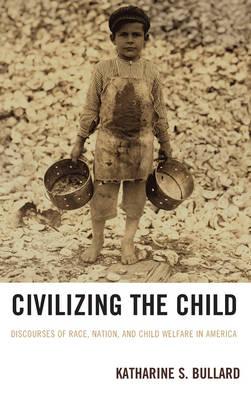Overview
In Civilizing the Child: Discourses of Race, Nation, and Child Welfare in America, Katherine S. Bullard analyzes the discourse of child welfare advocates who argued for the notion of a racialized ideal child. This ideal child, limited to white, often native-born children, was at the center of arguments for material support to children and education for their parents. This book illuminates important limitations in the Progressive approach to social welfare and helps to explain the current dearth of support for poor children. Civilizing the Child tracks the growing social concern with children in the nineteenth and early-twentieth centuries. The author uses seminal figures and institutions to look at the origins of the welfare state. Chapters focus on Charles Loring Brace, Jacob Riis, residents of the Hull House Settlement, and the staff of U.S. Children's Bureau, analyzing their work to unpack the assumptions about American identity that made certain children belong and others remain outsiders. Bullard traces the ways in which child welfare advocates used racialized language and emphasized the civilizing mission to argue for support of white native-born children. This language focused on the future citizenship of some children as an argument for their support and protection.
Full Product Details
Author: Katharine S. Bullard
Publisher: Lexington Books
Imprint: Lexington Books
Dimensions:
Width: 16.50cm
, Height: 1.10cm
, Length: 23.40cm
Weight: 0.249kg
ISBN: 9781498525404
ISBN 10: 1498525407
Pages: 158
Publication Date: 15 October 2015
Audience:
Professional and scholarly
,
Professional & Vocational
Format: Paperback
Publisher's Status: Active
Availability: Manufactured on demand

We will order this item for you from a manufactured on demand supplier.
Reviews
This thought-provoking study of child welfare reformers in the early twentieth-century U.S. argues that racial difference, national identity, and imperialist assumptions both inspired reformers' programs to improve the lives of the nation's children and set limits on their notions of deserving childhood. While reformers integrated the children of European immigrants into their vision of the ideal child upon whose welfare the fate of the nation depended, they did so by drawing increasingly rigid boundaries between 'whitened' Americans, who could lay claim to the nation's settler heritage, and racialized Others-African Americans, Asian Americans, Mexican Americans, and Native Americans-who did not fit into the national mythology of newcomers seeking (and finding) success in the New World. Civilizing the Child is a solidly researched and provocatively argued study that will be of interest to historians of social welfare and public policy, children and childhood, race and empire, and nineteenth- and twentieth-century America. -- Anya Jabour, University of Montana
Author Information
Katherine Bullard is assistant professor in the School of History, Political and International Studies at Fairleigh Dickinson University.




